Old Tewkesbury
While reading an old copy of Cotswold Life, I was intrigued by an article on ‘Counting Sheep’, written in 1971 by a lady from Lower Slaughter called Mary Hartley. This was for the area around the Cotswolds, describing a system that had been in use for many generations. I was struck by the fact that it seemed similar to the Welsh numbers that I had learned from my Father who came from mid-Wales.
The article suggested that the reader should look online at a recording made by an artist called Jake Thackray about Old Molly Metcalfe from Cumbria who apparently had been a shepherd there. After a little research, I also found a record of a similar sheep-counting method from the West Midlands. Again there was a certain similarity in the words used.
This led me on to look at the local dialect that I had done some research on a few years ago, and which had been spoken to me when I first came to Tewkesbury in 1950. I had been collecting local history for some time and found quite a few sources of dialect over the years and decided it would be an interesting journey to revisit them again. Together with this I looked at several other sources and decided to include some Tewkesbury items gleaned from many sources and put them together for no other purpose than my own interest. However, here they are and I hope they will be of some interest to readers
Sheep-counting
| No. | SWALEDALE | COTSWOLD | WELSH | SHIPSTON-ON-STOUR |
| 1 | Yan | Yan | Un | Ain |
| 2 | Tan | Tyan | Dau | Tain |
| 3 | Tether | Tethera | Tri | Fitherum |
| 4 | Mether | Methera | Pedwar | Fatherum |
| 5 | Pip | Pimp | Pump | Fac |
| 6 | Sethera | Chwe | Ack | |
| 7 | Lethera | Saith | Crack | |
| 8 | Hovera | Wyth | Libera | |
| 9 | Dovera | Naw | Col | |
| 10 | Dick | Deg | Dick | |
| 11 | Yan a dick | Un a deg | Aindick | |
| 12 | Tyan a dick | Dauddeg | Taindick | |
| 13 | Tethera dick | Trideg | Fitherumdick | |
| 14 | Methera dick | Pedwar ddeg | Fatherumdick | |
| 15 | Bumfit | Pymtheg | Banshi | |
| 16 | Yan a bumfit | Un ar bymtheg | Ain a banshi | |
| 17 | Tyan a bumfit | Dau ar bymtheg | Tain a banshi | |
| 18 | Tethera bumfit | Daunaw [2 nine] | Bumkin | |
| 19 | Methera bumfit | Pedwar bymtheg | Ain a bumkin | |
| 20 | Gigot | Ugain | Jigot |
The method of counting in the areas I have found, only goes up to twenty. After that we can only assume that the shepherd cut a notch in a stick or put a stone in his pocket. There is even a song about sheep-counting which has been recorded. It focuses upon a young girl whose job it was to mind sheep – and she had to be able to count.
Jake Thackray[1] recounted this story and this is the first verse:
Old Molly Metcalfe counting sheep,
Yan Tan Tether Mether Pip she counted,
Up on Swaledale steep and bleak,
Yan Tan Tether Mether Pip she counted.
The pronunciation of Welsh is different of course: U is given the sound of EE, as in tree; two D’s together becomes th, and so on. There is a distinct similarity in some of the numbers, and we can only wonder if there was communication between the various districts, although the buying and selling must have brought the farmers and shepherds in contact regularly.
Local Dialect
I was given these few words from a local chap whom I came to know after being posted to Ashchurch Camp for National Service. We were walking through the town and he trotted out the following phrases – and completely baffled me:
Phrases: “He hit his yud agyunst a shud and now he’s djud”; “Whur bist thee gwine”? “They bwois skelmed down all my beuns”; and “I beunt gwine nowhurs”.
The verb ‘to be’ becomes – I be, Thee Bist, He Be, We Be, Thee Art, They Be.
Terms: Codd: Foreman, Boss; Yat: Gate; Strickle: Straight piece of wood for levelling sand; Balderick: Strap for hanging a bell; Stricke: measure of grain, approx. 2 bushells; Yur: Here; Shup: Sheep; Chup: Cheap.
Some phrases are a little clearer with an explanation:
“If I’d a-knowed, I ’ood never a-went” becomes “Had I known I wouldn’t have gone”; “Don’t tell I, tell ’ee”, “Don’t tell me, tell him”; “I beunt a’feared o’ they wops” [Wops is an Anglo-Saxon spelling which has gradually transformed into Wasp], “I’m not afraid of the wasps”; “Coupe Down”, “to crouch down”.
Some of the words and phrases are also found in the Forest of Dean and in the Bristol area, for example, “My Old Butt”, “My old Pal”.
Names New and Old
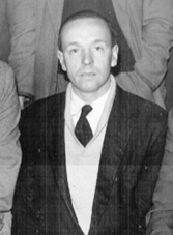
Brian Linnell in his book, Theot Guppy and Wulf [2] recorded a list of names and ‘nicknames’. The list is quite extensive and covers a large portion of the townspeople, living and passed away. The explanations of the sources are sometimes a little contrived but could easily be envisaged and I am grateful for the references.
However, I only intend to refer to those people that I knew personally, or was familiar with during the past sixty years. They are in no particular order, but appear just as they come to mind.
Sticker Mace: One of two or three brothers, Stan lived in Cotteswold Road and at the time I knew him, worked at the Cotteswold Dairy. The name comes from a mace being a stick, hence ‘Sticker’. I first came across it whilst I was running the Swifts Boys Club, and a boy joined I did not know. I asked him his name and he said “Sticker Mace”, I asked how he got that name and he said, “It’s what my Dad is called”.
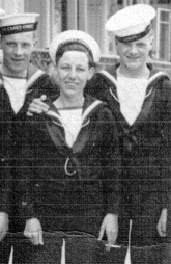
Ronnie Garfield: His nickname cannot be used today. Although a youthful member of the Sea Cadets, he was in fact one of the unsung heroes of the Korean War. Contemporaries will recall his nickname – which is somewhat ironic due to his military service. He was in the Gloucestershire Regiment when the war broke out. I was serving at Ashchurch Camp at the time, and we were all told that the army was looking for volunteers to fight the foe! Only three volunteered and only two went. Ronnie survived and came home apparently no worse for his trials abroad.
Snowy Willis: He had a blonde head of hair, thus ‘Snowy’. He was born in Foresters Road and worked in two of the large local engineering companies. The story was that he found a piece of a shell during the war, tried it out with a hammer, and caused a small explosion injuring his leg. The result was a limp that lasted Snowy all his life.
Blower Twigg: Lived in Gravel Walk, with his wife and a small brown dog. He too had a blonde thatch, though fairly thin when I knew him. Opposite the entrance to Gravel Walk was a row of two shops and a ‘chippy’. At the top of Gravel Walk stands the Albion pub: both essential factors in the saga. On a winter evening, I came out of the cottage in Greens Buildings, where we lived, to purchase a fish supper. A small car was parked outside the chippy and, as I walked across the road, I saw a man lying under the front wheels of the car. My first thought was that he had been hit and killed. I knelt down and saw there was a great deal of blood coming from a head wound. I struggled to get him conscious and upright, and asked him what happened; but he didn’t know. I helped him to get to his house down the Walk and got him inside. All the way home he kept saying, “Don’t tell the wife, don’t tell the wife”. I washed him off, sat him down and left. I told my wife what had happened when I got back and described the man. “Ha, that’s Blower Twigg and he wasn’t hurt but drunk on the cider”.
Smacker Collins: I lived next-door to this friendly fellow. The nickname comes from a slovenly approach to gardening, according to Linnell, but the name was quite inappropriate. He worked at Ashchurch Station and looked after the gardens there. He was most conscientious and capable.
Photo:3. The former Upper High Street now underneath the Shopping Centre – the black and white building was the Doddo Café and to the left was Nellie Jones’ Shop. (Author)
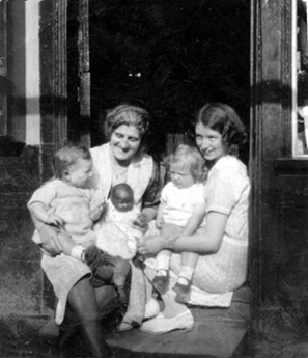
Nellie Jones: If you look at the photographs taken of the upper High Street before the area was developed, you will see a small row of shops, running from the Doddo Café to the Sabrina Cinema. In the middle of the row, there is a small shop with two steps leading up to the shop door. Nellie ran this shop and sold almost everything, an old-fashioned shop providing for the people living in the alleys nearby. The owner was a feisty lady and she introduced the first ice-cream making machine in the town. Children were offered the chance to wind the handle that crushed ice for fifteen minutes and at the end of their action a free ice-cream was the reward.
Before the Second World War, there was a visit from the National Fascist organisation, the ‘Blackshirts’, led by Sir Oswald Mosley. When he began to address the people, Nellie Jones did not care for his politics and decided to take action. She approached the rostrum and kicked the box on which he was standing, much to the amusement of the locals. It was her practice to put boxes of goods onto the pavement beside the steps leading into the shop. When the police decided to prosecute her for placing boxes of produce on the pavement, she whacked the officer, much to his surprise – and refused to move them. What the police were not aware of was that her property stretched the width of the steps on the pavement and she had the right to place her produce there! Another success for the common people!
Photo: Nellie Jones showing her gentle side. Jean McGiven, who provided the photograph, is the blond child to the right. (Editor)Fred Proctor: He lived the latter part of his life in the Honor Collins Cottage on Swilgate Road with his wife. Fred never slept in his bed after a terrible accident: his wife had been asleep in bed and tried to call him – she was having a heart attack. Sadly she died and so Fred never slept in his bed again, preferring to use the chair downstairs. During the First World War, Fred was a conscientious objector, refusing to serve in the forces. As a result, he was sent to Dartmoor Prison for the duration. Many is the time I spoke to him, seated outside the Methodist Church at the Cross, wearing his prison hat with its broad arrows! He was also a staunch supporter of Tewkesbury Cricket Club and, when he passed away, he left £100 to the club. In his youth, he was quite adventurous. A colleague told me that Fred would get up on the Mythe Bridge, whilst the regatta was taking place, and dive off into the Severn at a shilling-a-time for the spectators. After his normal retirement, he became a bearer for the local undertaker until well into his eighties. They don’t make ’em like that anymore!
Photo:4. Fred Proctor as a candidate for the Town Council Elections in 1931 (Tewkesbury Register)
to Expand
Uncle Whales: Calling himself an engineer, Mr. Whales (full name: Alpha Irving Whales) had his shop two doors away from the Museum in Barton Street. His major business, however, appeared to be the hire of bicycles to the general public. The charge was 2d., but you had to return the bike before the shop closed. My witness tells me that bikes were left in the alley alongside the shop to avoid having to pay the charge! He provided an option: two or three wheelers, relics from the early nineteen-hundreds perhaps.
Ghandi Sallis: I first met him about 1950, when he came home on leave during National Service. We were in the old milk bar in the High Street,[3] listening to the juke box, and a friend introduced us. He worked for Bill Shakespeare in his boat yard for many years, married a local girl, one of twins. Sadly he was another funny chap, taken from his family at an early age. He was awarded the nickname because of his looks!Pip Goodwin: As the name implies, he was quite a small chap, slight of build but a hard worker. For a number of years, he kept the main streets clean – all without pay. Whatever he found in the way of spare change dropped in the street, he kept, of course. He enjoyed a drink, most evenings, and became somewhat noisy whilst ‘in his cups’. At the weekend, he would call in at the Swilgate Cricket Ground on his way home, ringing his bell and calling out loudly in a high pitched voice – words undecipherable to the teams on view. He would then proceed, still ringing the bell, along Swilgate Road to a cottage overlooking the cricket ground, together with Fred Proctor, who lived in the cottage. He had a small balcony in his garden where he and his cronies would sit and barrack if play got too slow, giving the bell a good workout.
On the occasion of a special match, when the Gloucestershire County sent a team, sponsored by a well-known brewery, a marquee was set up where customers paid 10/- [50p] for the first drink and then the rest was free. Birthday and Christmas come all together! Pip had a brother who had played for Tewkesbury Cricket Club and had been given a trial by the County Club. He was an excellent bat, earning the name “Dipper”, after the old Glos. and England player, Alfred Dipper, from Apperley. Like many another first-rate players, Dipper came from the ‘wrong side of the track’ and didn’t get another chance. He was always smartly dressed when out and about, dark blue pinstripe suit and dark hair brushed smartly back. His portrait was painted in oils by the Tewkesbury artist, John McClellan. I remember seeing it as it was being framed. It was exhibited in the Royal Academy at the annual selection; I assume that it must have been sold as it never came back to Tewkesbury.
to Expand
Tommy Wilkins: A short upright man, and quite stocky, as seen in an old photograph of the YMCA football team. Easily identified, wearing a suit and trilby hat, he was almost never seen without his bicycle. He never married, but frequented the local pubs regularly. After closing time on Saturday night, he would arrive at The Watson Hall, where the weekly dance was in progress, together with his dancing partner – a ‘gent’ of similar age and stature, with whom he ‘tripped the light fantastic’, no trouble to anyone and always polite, a touch of the hat, and “Goodnight, Sir”. His bike always saw him home, perhaps he is still trundling it – up there.
Swallow Hopton: I knew him in his old age, perhaps seventy plus. Looking at a picture of the Tewkesbury Town football team of the twenties, with a trophy won that year, he sits at the front, displaying two ringlets, one each side of his brow. At seventy plus they were still there and he was still whistling, as his nickname indicated when he was a young soldier. As in a lot of local families, his son, Alf, also played football for the YMCA for a number of years, and also basked in the glorious name of Swallow – and still does.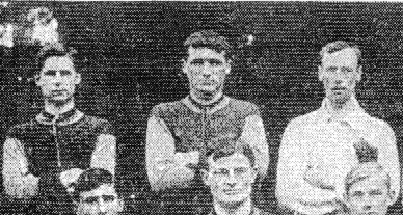
Tiny Bourton: Another sporting family, the original Tiny was the goalkeeper for the local team in the early nineteen hundreds. The name, of course, indicates a large-framed individual as the photograph shows (centre back). His son, Harold ‘Tiny’ Bourton, also followed that path, playing both football and cricket for the town. He had three sons, but it was Jim, the eldest, who carried on the tradition, keeping goal for the YMCA and playing cricket with his brother, Les, for Tewkesbury – whilst the father, Harold, did a spell of umpiring for the team.
Teachers
to Expand
I guess that this group of people will always be the recipient of odd names. The few that come to mind from the recent past are:
Torso (Jimmy) Knoyle: Of Tewkesbury Grammar School. He was a short, stocky chap who took the boys for sports. He was also in one of the enthusiastic amateur dramatics group in the town.
Nabber Nation and Dabfoot Leatham: Both headmasters of Tewkesbury Boys School; I am told that ‘Dabfoot’ had a bit of a limp!
Tick Creeth: Of Tewkesbury Grammar School. He became a councillor, the first Labour member for the town for many years, after he had served in the RAF during the war. He formed the first Air Cadet Group, based on the Grammar School, and many of the old boys will remember him with some affection. Perhaps ‘Tick’ from marking papers.
Snowy Booth: He had a special job, Caretaker of the Girls High School and Groundsman at the Swilgate Ground, used by the girls for PE and other sports. Snowy would open up the pavilion for the girls to change and lock up afterwards. Surrounded by the opposite sex, Snowy never married, nor as long as I knew him, did he ever have a girlfriend.
Photo: Tick’ Creeth keeping a military eye on Rev. PurefoyYouth Work
to Expand
There are a few names that have arisen during my stay in Tewkesbury, mainly from the boys who came to the Swifts Boys Club. These were names given to them by the other lads and either refer to an event or a family member.
Honk (Roger) Hopton: This was just alliteration. His family were in the haulage business, into which he went after leaving school.Jiggy Jordan: Just an alliteration name, but George was a thick-set chap, who fancied himself as a sportsman. It was his habit, with a little encouragement from ‘friends’, to take to running around the Ham Field, a couple of miles! Sadly George was rather eccentric and passed away at an early age.
Phebo Hallings: A young man left as a souvenir of the GI visitors to Ashchurch Camp during the war. An excellent sportsman, powerfully built as a schoolboy, the record for the Schools’ Javelin for Gloucestershire is still in his name. Sadly, he did not fare well in subsequent years and died mysteriously at an early age.
Photo: Phebo pushing the winning team (Author )(This and the previous photo are of the pram-race charity events held by the Fire Service in the 1960s.
to Expand
Kipper (Chris) Attwell: He told his pals that he had a kitten at home called ‘Kipper’! He lived in Steels Court in the High Street and his family were the last to live there before it was demolished in the development of the upper High Street. At that time there were only two houses left, both had been declared ‘Condemned’ for some time before they were empty. Chris was a cricketer and whilst playing in a match against Cheltenham, a strong local club, Chris took all ten wickets, a most unusual feat.
Chris Attwell was just one of the many characters whose company I have enjoyed over the years. Here I am, too many years ago, with Chris and with our Mayor, Harry Workman.
References
- Jake Thackray (1938-2002) was a singer-songwriter, poet and journalist, born in Leeds into a Catholic family. He studied modern languages at university and lived in France, being particularly inspired by the anti-establishment ‘chansonnier’, George Brassens. He found TV fame on Braden’s Week. He also loved the language of North Yorkshire, hence his song, Molly Metcalfe. [Editor]
- Published by Theoc Press, 1978; now out of print.
- Severn Valley Milk Bar, 105 High Street in 1949.
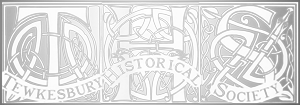
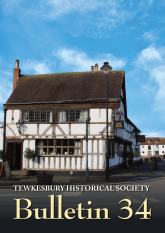
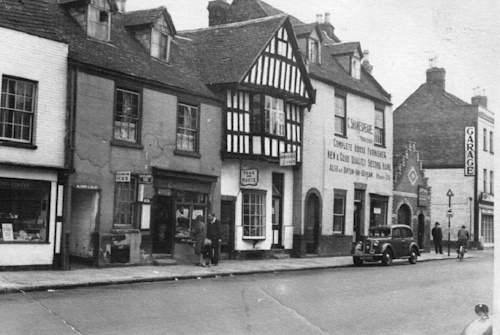
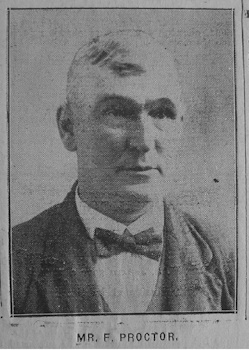
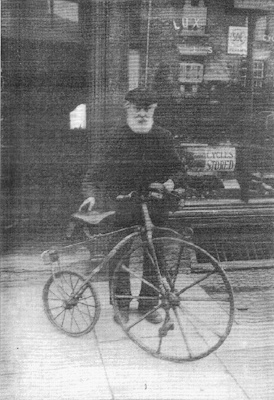
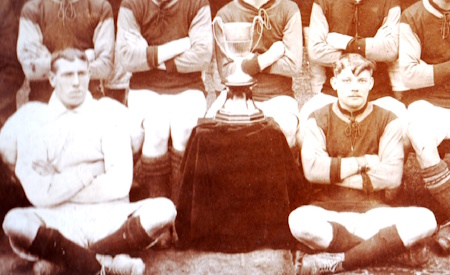
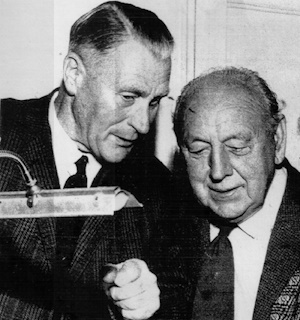
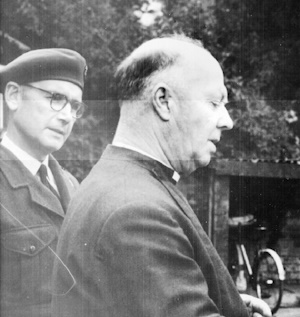
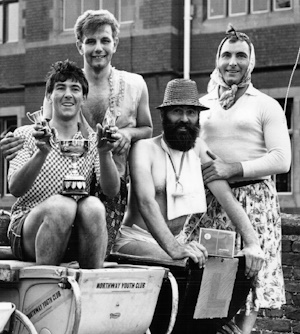
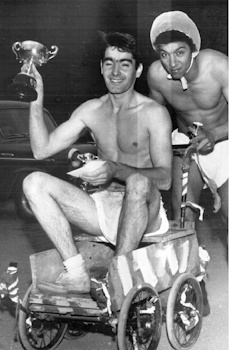
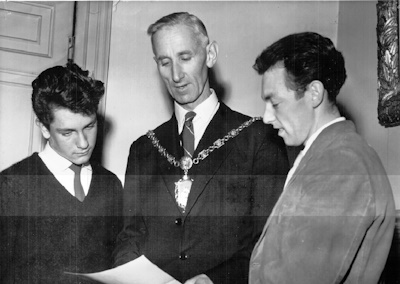
Comments